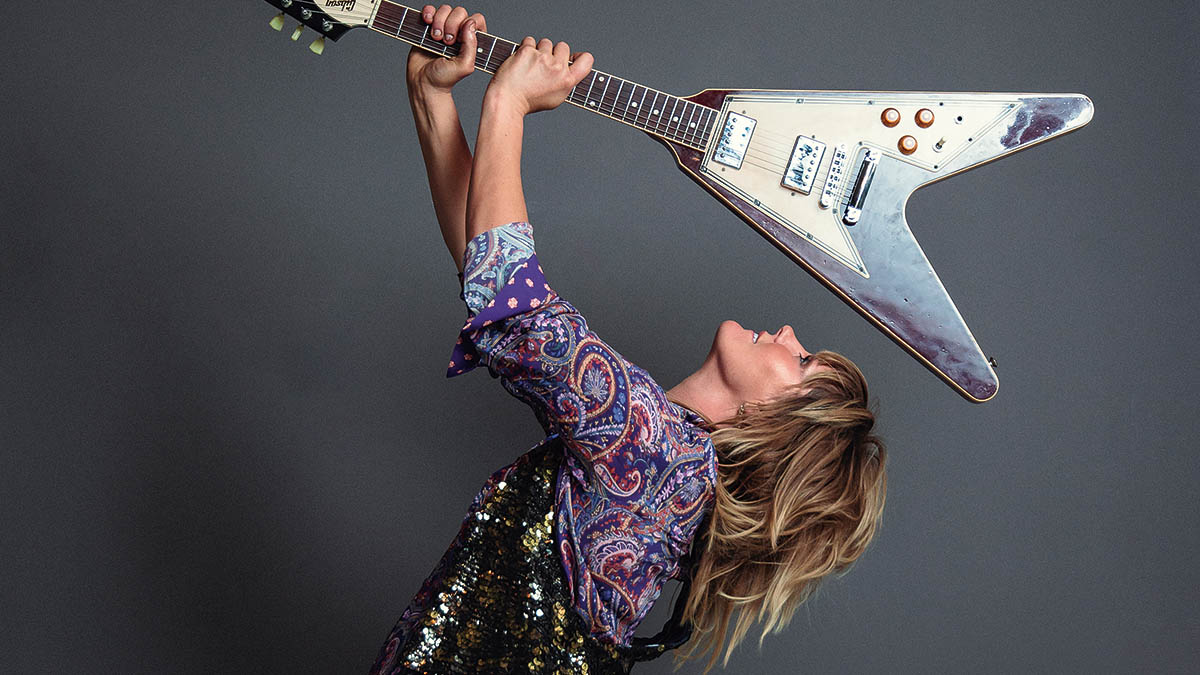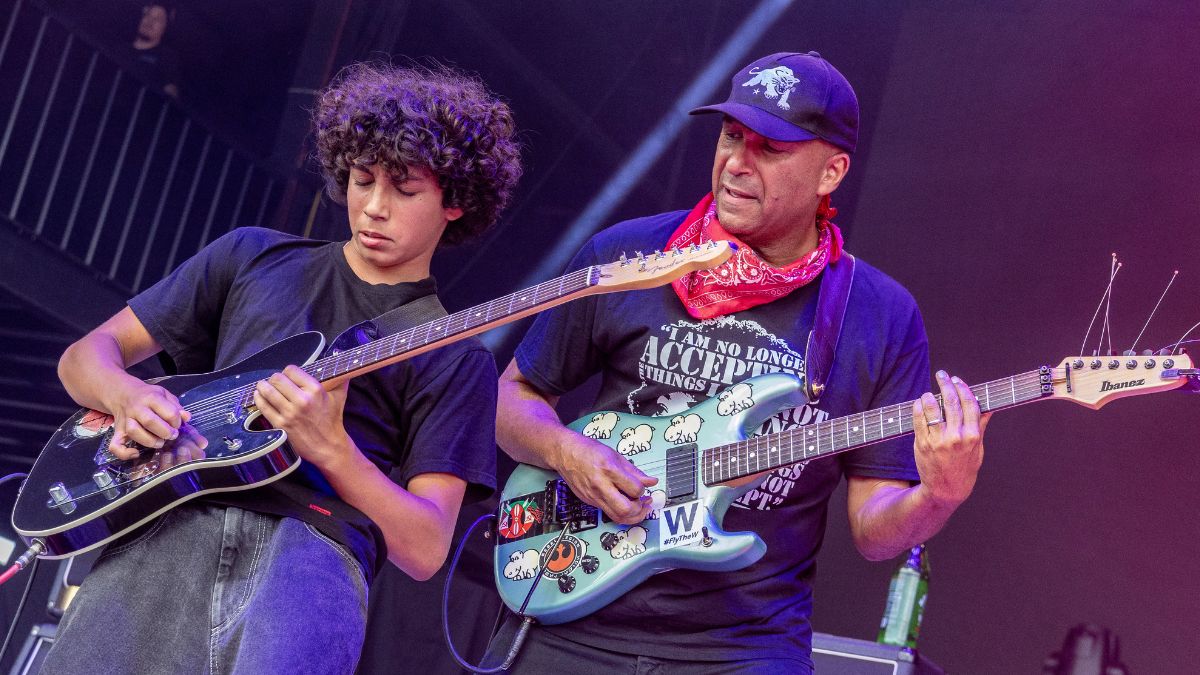“Dave Cobb’s ’40s Martin is one of my favorite guitars I have ever touched in my life – I really wanted to steal that guitar!” Grace Potter went on the mother of all road trips… then embarked on the mother of all recording sessions
How Grace Potter put a new spin on rootsy Americana with famous friends, oddball vintage gear and DIY guitar hacks

The drive from Fayston, Vermont, to Topanga Valley, California, spans the breadth of the continental USA and clocks in just shy of 3,000 miles. It’ll take around 44 hours behind the wheel, plenty of time to do some thinking. Ask Grace Potter – she’s been there, done that.
It’s where her new solo studio album, Mother Road, first started coming together, not that she knew it at the time as she wrestled a big ol’ fold-out Rand McNally Road Atlas, marking the route with a Sharpie.
There were no melody lines hummed into an iPhone. Grace had more pressing things on her mind, such as the car itself, a 2020 VW Atlas, that she swears was trying to kill her. “It was a lemon,” she says. “The electrics on the inside were fucking up, making me accelerate randomly. Something had gone wrong in the wiring in that car and I almost died.”
She upgraded the Atlas to a 2021 model for the return leg of the journey but all this forward motion – maybe the danger, too – was doing her good. She was putting some distance between her and her problems, getting the head straight.
“I genuinely needed it,” she recalls. “I desperately needed that road, the amalgamation of heart and soul, and movement and stillness all at once, that I can only achieve all at once when I am out on the road.”
There was also a material reason for these epic shuttle runs. She was grabbing gear – guitars, recording consoles, microphones – from her home in Topanga, taking it back to her farm in Vermont. Back on the farm, her husband, the producer Eric Valentine, had the soldering iron running hot, restoring an old 1954 RCA broadcasting console he planned to use on studio sessions. More on that shortly.
As Grace clocked up the miles, she kept her eyes on the road and on the people she would see at diners and truck stops, thinking up stories, seeing herself in different characters.
All the latest guitar news, interviews, lessons, reviews, deals and more, direct to your inbox!
When Valentine was booked to record the new Nickel Creek album, Celebrants, down in Nashville at RCA Studios, there was an opportunity for Grace to turn these thoughts into songs, to get a band together and track them. Some players she knew well, like the former Tom Petty & The Heartbreakers keys player Benmont Tench and drummer Matt Musty.
Others less so, such as Nick Bockrath of Cage the Elephant. Grace had cut his hair once when they were all on tour with Rayland Baxter but had never actually played with him.
“His guitar playing was just so lonely and anxious and perfect,” she says. “He really knew the Nashville sound, so if I had to lean on that Nashville sound I knew he could go there. But if I wanted to go weirder, he would be right there beside me. I needed somebody who was a pro I could just throw in, the way Dylan used to do when he was making records. I don’t want the band to learn it too good, let’s just do it!”
With Tim Deaux (The Whigs/Kings Of Leon) on bass, Dan Kalisher on pedal steel, Valentine joining in, too, Grace got right down to it. It was time to test that RCA console and see what it had. The game plan was to jump in and track live and fix later.
“There are just so many more things about the live band experience. You can always add things but you cannot recreate that energy that was happening in the studio,” she says. “Everything you hear, every single lyric – except for two songs where I smashed into the microphone and had to replace a word – was done live. All of the instruments were done live with the exception of timpani and backing vocals.”
The songs were made up as she went along, reinventing characters from the road in verse. Lady Vagabond was inspired by the story of a child runaway who drowns in the river and is reincarnated as a badass – and it sounds badass. Reincarnated, too. It opens like a lost recording of a Morricone scratch track before barrelling into a wild west outlaw acoustic strum. Grace needed her map once more to explain the composition. It went a little something like this…
“What I immediately heard in my mind was Peruvian or Ecuadorian flutes from the Andes mountains,” she explains.
“I heard the wailing of a funeral march in New Orleans. And then I heard this incredibly driving Mariachi guitar, from a bullfight in Mexico City, and I don’t know where any of those things came from, or if they belong together, but I also heard this Sly & the Family Stone, disco-funk, Vegas show tune. I came into the studio this day and said, ‘All right, everybody, here is the arrangement!’”
There it was. Laid out in red ink on a map. Dave Cobb, who is custodian of RCA’s Studio A, had just the guitar for it, a vintage Martin from the ’40s, and he is lucky he still has it. “That is one of my favourite guitars I have ever touched in my life,” Grace says. “I really wanted to steal that guitar. It sings. It sings all day.”
The Martin had the sound, but Grace didn’t want the B and high E strings ringing out, so they were muted with a piece of foam. “It was like there was a little kid pinching her fingers around it,” she says. “I would play and create this thwack. It was still this percussive sound but it would be muted so there would be no overtones, no ringing, no pitch. Only the thwack of it.”
There were other weird off-road items, oddball bits and pieces that made a cool noise and thus made the cut. There was Valentine’s old Welson electric guitar that added some throatiness to the soul groove of Good Time. There was an old Califone amp loaded with Jensen speakers. It broke more often than not but that was okay. They had others.
Most of the time Grace went through a Supro. Bockrath had all kinds of amps laid out before him, though he favoured a Bigsby-equipped Les Paul. That RCA console? They sent Tim Deaux’s Fender Bass VI direct, reamping it to use the slap of the reverb tail in the final recording.
“It was a really edgy approach which Eric didn’t know was going to work,” Grace says. “When we heard it, especially in the ’70s Vegas section of Lady Vagabond, it was like, ‘Okay, there it is!’ The Bass VI is not a ‘six-string bass.’ It is a very specific sound, à la Jack Nitzsche, that early Duane Eddie Have ‘Twangy’ Guitar Will Travel, Nashville sound. I am such a huge fan of bass guitar as a talking instrument.”
A talking instrument? It’s as though it were a character. But Mother Road is all about character, Potter restlessly exploring their personalities with different sounds, then using these characters as a mechanism for exploring her own, storytelling as therapy. It worked. “Seeing elements of myself in characters, especially parts I don’t like, that made me more forgiving of myself,” she says.
- Mother Road is out now via Fantasy.
Jonathan Horsley has been writing about guitars since 2005, playing them since 1990, and regularly contributes to publications including Guitar World, MusicRadar and Total Guitar. He uses Jazz III nylon picks, 10s during the week, 9s at the weekend, and shamefully still struggles with rhythm figure one of Van Halen’s Panama.





